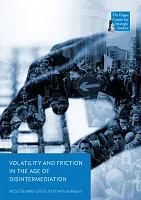Brexit, Trump, Chinese cyberaanvallen, Russische propaganda, oorlogen in het Midden Oosten. Het is alsof de wereld in een geopolitieke achtbaan terecht is gekomen. De snelheid waarmee gebeurtenissen elkaar opvolgen is duizelingwekkend.
In deze wereld is het steeds moeilijker om door de bomen het bos nog te zien. Het is steeds moeilijker feit van fictie te onderscheiden, en het is steeds moeilijker om betekenisvolle trends te identificeren te midden van deze stortvloed van events.
Hier biedt ons StratMon jaarrapport soelaas. In de HCSS StratMon geven wij een overzicht van trends op het gebied van cooperatie en competitie en vrede en conflict in het internationaal systeem. Dit StratMon jaarrapport is onze bijdrage aan de Strategische Monitor van het Ministerie van Defensie en Buitenlandse Zaken.
In onze HCSS Stratbase hebben wij de afgelopen jaren een grote hoeveelheid datasets verzameld. Hiermee monitoren wij de assertiviteit van grote mogendheden op economisch, politiek en militair vlak. Wij beschrijven welke landen meer of minder invloed hebben in het internationaal systeem. Wij analyseren hoe Nederland zich in dat mondiale krachtenveld beweegt. En wij identificeren aan de hand van onze conflict modellen waar in de wereld het risico op gewelddadig politiek conflict hoog is.
In onze HCSS StratMon bieden wij ook een alternatieve nieuwe verklaring voor de frictie en volatiliteit die wij de laatste jaren observeren in de internationale betrekkingen.
Centraal in onze verklaring staat het concept van ‘desintermediatie’ . Dat is een moeilijk woord voor het wegvallen van tussenpersonen of tussenlagen in de interactie tussen mensen en organisaties. Desintermediatie is al een wijdverbreid fenomeen in het bedrijfsleven. Van Airbnb en Uber tot aan Alibaba: deze bedrijven faciliteren de directe interactie tussen dienstverlener en consument.
We zien NU dit fenomeen ook terug in het politieke en veiligheidsdomein. Trump had de hoofdredactie van de New York Times niet nodig om president te worden maar gebruikte Twitter. ISIS had CNN niet nodig om haar boodschap te verkondigen maar kon dit doen via Youtube. In ons HCSS StratMon rapport leggen wij uit hoe wij verwachten dat desintermediatie de komende jaren tot meer frictie en volatiliteit zal leiden.
Tot slot bieden wij ook aanbevelingen voor het Nederlandse Defensie en Veiligheidsbeleid en waar dat zich op moet richten in dit tijdperk van desintermediatie.
Zie video toelichting
Toespraak van Minister Koenders leest u hier.






